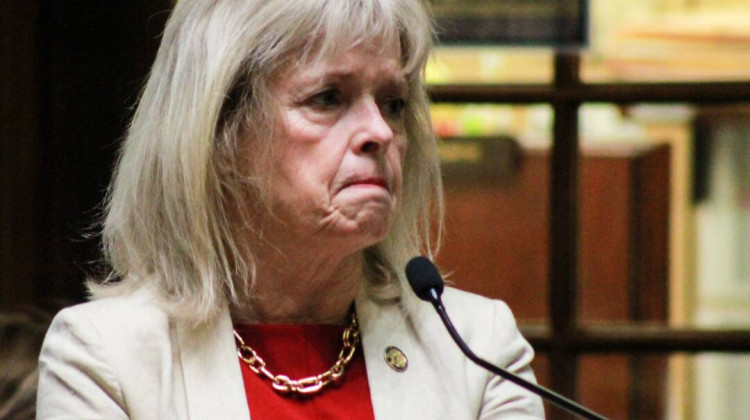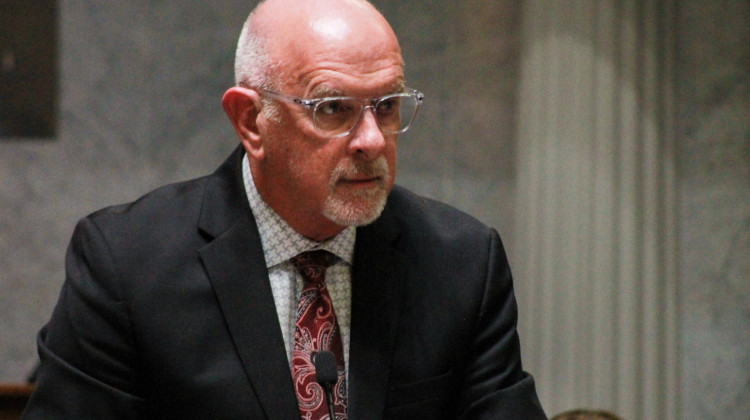One month after Landis Reynolds’ 16th birthday, he said he made a horrible choice with consequences he didn’t understand.
“One week, I'm doing homework, I'm playing video games, I'm hanging out with friends, the next in this wing surrounded by men that I don't necessarily think a 16-year-old should have been surrounded by,” he said during an interview at the Westville Correctional Facility, a prison in northwest Indiana.
Reynolds has been incarcerated for more than half his life. After spending a year in jail, surrounded by adults who had been in and out of prison for violent crimes, he was sentenced to 50 years for murder and aggravated battery.
Even though he was 16 when he was arrested, Reynolds was automatically charged as an adult. Every year, dozens of young Hoosiers are charged as adults – the vast majority of whom are also children of color.
Some experts say charging youth – whose brains have not developed to understand the implications of their actions – as adults can set kids up to fail for the rest of their lives. And while some Indiana lawmakers have worked toward changing policy to send fewer children to adult court, proposed legislation hasn’t gained traction.
How youth can be charged as adults in Indiana
In Indiana, youth can be charged as adults in two different ways.
First, they can be waived into the adult court system. These cases begin in juvenile court and are transferred to adult court – a process that begins when the prosecution files a motion arguing why the case should fall under adult court jurisdiction. This can happen to youth at a variety of ages, depending on the severity of the offense – for example, children as young as 12 can be waived to adult court for murder.
The second option is direct file. If a youth is directly filed into adult court, a juvenile judge does not look at the case. This largely happens to 16 or 17 year olds. Offenses that could lead todirect file include armed robbery, murder and rape.
According to the most recent data, from July 2020 to June 2021, 65 teens were direct filed into the adult system in Indiana. 85 percent of those youth were Black. That’s up from 74 percent the year before, and 66 percent the year before that.
Joel Wieneke, an attorney with the Indiana Public Defenders Council, said most of the crimes that result in direct file are products of poverty, poor education, and people of color dealing with conflict and problems that their White peers largely do not face.
“Most of the kids I talked to make it clear that they're not intending to kill somebody or cause some big problem,” he said. “But they don't feel safe. And they feel that they're obligated to carry a gun because they know that there's a lot of other people in their communities who are carrying guns and are not afraid to use them. But then that kind of perpetuates the cycle, doesn't it?”
Reynolds, who was charged as an adult at age 16, is Black. He said he’s seen the disadvantage people of color face in the system.
“A lot of the guys that I came to prison with, they came from some horrible backgrounds,” he said. “And a lot of times they were just playing the cards that they were dealt. They were let down at home, and then once they basically succumbed to the circumstances that they were born into, they were let down again in the justice system. And that's not fair.”
A push to move away from direct file
Some states, such as Kentucky, California and Vermont, are moving away from practices like direct file. Instead, cases involving children are first examined by a juvenile judge to decide if the case should be moved to adult court.
State Sen. Jean Breaux (D-Indianapolis) and other Democrats have tried introducing legislation for the past several years that would eliminate direct file in Indiana. But those bills have never received hearings. Breaux said Republican lawmakers have not been open to the idea of no longer directly filing children into the adult system.
“We don't have an environment in Indiana that really caters or understands the unique needs of children in our court system,” she said. “So this has been something that we've had to educate lawmakers on, and show the disparities, are the inequities in the law as it currently stands.”
She is particularly concerned about the disparity that exists for children of color.
“The practice of direct file – it strips a juvenile court judge from using their discretion about that child and their circumstances that brought them before the court,” Breaux said.
Breaux said she plans to introduce legislation again in the upcoming session, and hopes that more lawmakers from the other side of the aisle will be supportive.
Rep. Wendy McNamara (R-Evansville) co-chaired the Juvenile Justice Reform Task Force, which was formed in 2020 and includes lawmakers and juvenile justice system stakeholders from across the state. In a statement, she said the taskforce put forward various policy changes that resulted in HB 1359, which passed earlier this year. Now, the state does not detain children under the age of 12.
McNamara said in her statement the “issue of direct file” was not part of the task force’s recommendations.
Reynolds, who was directly filed into adult court, said Indiana should move away from direct file, adding that each case is different and kids come from different circumstances and backgrounds.
“In no way am I making excuses for the juveniles that commit egregious offenses,” he said. “But a lot of times they grow up in environments permeated with violence. That's all they know.”

The issue of brain development
Marion County Juvenile Judge Geoffrey Gaither said being tried as an adult is the only option for some teens.
“I don't think the adult system can claim a whole lot of success in what they do,” he said. “There are some kids that come through the system we cannot help. And their threat to public safety is so great that detention is the right thing to do.”
But experts and advocates argue that juveniles don’t have the mental development of an adult, which allows them to understand the implications of their actions.
Reynolds emphasized that he did not have the capacity to understand the consequences of his actions when he was 16 and charged as an adult. He said that didn’t happen until he was in his mid-twenties, about 10 years into his incarceration.
“I did not comprehend the impact that it was going to have on the victim's family, or my family, or my future,” he said.
Children also don’t understand the legal jargon and procedures that take place in adult court, said Melissa Sickmond, director of the National Juvenile Justice Center, a national nonprofit that collects data on youth involved in the criminal justice system. The legal system can be difficult to navigate even for someone who isn’t a minor.
“You're supposed to be able to understand the proceedings, and to aid in your defense,” she said. “Most adults really don't meet that.”
Indiana Public Defenders Council attorney Wieneke said inconsistencies exist within laws more broadly when it comes to what children are able to understand. He pointed to Indiana’s recent law raising the legal smoking age to 21, and one argument that children can’t understand the lifelong implications of starting to smoke.
“But we still can waive a kid as young as 12 to the adult court system to face a lifelong punishment for something that they did,” he said.

Coming home brings anxiety, uncertainty
For incarcerated people, being released and re-entering society brings its own challenges. That’s especially true for those who were incarcerated as juveniles.
Angaza Bahar was 17 when he was first charged as an adult for battery. He spent about nine months in prison, and shortly after he got out, he was incarcerated again for attempted murder. This time, his sentence was for more than 25 years.
“I had no clue and no idea the effects of being put in the adult system at an early age, how many disadvantages that it has towards you,” Bahar said.
He was released during the summer of 2020, but he said was detained again after violating conditions for his parole. Bahar, now 47, has been out of prison for about four months. But he said he’s scared that he will be incarcerated again.
Bahar also said it’s been difficult to adjust to the outside world. He was a boy when he was first detained in an adult prison, and said he was raised behind bars by fellow incarcerated men. Prison didn’t prepare him for life after release, and with no previous jobs or work experience, he turned to manual labor, which he said takes a toll.
“With no job or resume, what else is there out there to offer?” he said. “So now, it's a catch-22. This is killing me. This will tear my body down in a matter of a few years. But I got to survive, I got to take care of myself. Where do I go? What do I turn to?”
Striving for rehabilitation in ‘the worst environment’
Reynolds currently has another five years left of his sentence until his earliest possible release date, but he might be able to get out sooner, as he’s working toward a college degree.
He said he feels anxious about being released, but is determined to meet the requirements of his parole. He’s already preparing for what lies ahead.
“Failure is not an option,” Reynolds said.
Reflecting on his incarceration, Reynolds said he only sees the adult prison system as punitive. He emphasized he should face consequences for his crime, but also felt that being sent to adult prison for decades had no rehabilitative effect for him or other youth in similar situations.
“So you’ve got to ask yourself – who do you want this person to become over the next 20 to 30 years?” he said. “With the current system, you place them in the worst environment in their most formative years. And essentially, what you're doing is you're manufacturing monsters.”
Once released, Reynolds said he wants to focus on nonprofit work to help others impacted by the justice system. He argues that Indiana should give incarcerated children resources and programming to better themselves and become positive influences on society.
“You can't put a number of years on a person's life,” Reynolds said. “But what you can do is you can fix an individual. And make sure two lives aren't lost.”
Contact WFYI criminal justice reporter Katrina Pross at kpross@wfyi.org. Follow on Twitter: @katrina_pross.
Pross is a Corps Member of Report for America, an initiative of The GroundTruth Project.
 DONATE
DONATE







 Support WFYI. We can't do it without you.
Support WFYI. We can't do it without you.